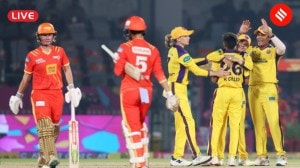Sinha says he is sinless
Yashwant Sinha is getting adept at defending himself, having had a fairly gruelling summer at doing just that. First he had to defend his bu...

Yashwant Sinha is getting adept at defending himself, having had a fairly gruelling summer at doing just that. First he had to defend his budget and then he had to defend the rollbacks on his budget proposals. Wednesday saw him in defence mode yet again, this time against charges made in a Sunday Express story of having used poll material supplied by the chairman and managing director of Flex industries, Ashok Chaturvedi.
Now anyone who has followed the recent career of Chaturvedi recognises him for having been caught by the CBI bribing the chief excise commissioner of Delhi, Someshwar Mishra, last November. They also know him for having footed the bills for parties that Prabhat Kumar threw while he was cabinet secretary.
In other words, Chaturvedi was a classic representative of a tribe that proliferates in the Capital8217;s underbelly, free-floating individuals who build their clout by rendering favours to the powerful, who grant them favours in turn.
So what does Sinha now say? While, he does not deny the facts in the news report, he rejects the implications that can be drawn from them. He claimed that it was a 8216;8216;transparent and above board8217;8217; transaction that he had entered with Flex; that he had duly paid for the material sent to him, and that he had no relationship with Chaturvedi. But something is not quite right here.
Here is an individual who has since been exposed for the close links he had established with some in the political dispensation. When the CBI was able to tape Chaturvedi actually asking Mishra how he wanted to be bribed, why did not a senior functionary like the Union finance minister not think it necessary to come clean on his past links with this very same individual?
Sinha now claims that neither his dignity as a member of Parliament nor my effectiveness as minister of finance stands compromised as a result of this transaction. All that can be said is that the bar Sinha sets for his 8216;8216;dignity8217;8217; and 8216;8216;effectiveness8217;8217; is very low indeed. If he does not discern conflict of interest when it is staring him in the face, then how effective can he be as the custodian of the nation8217;s economy? The very fact that the officers handling the Flex imbroglio have been transferred is one of the intriguing factors in this case. Kailash Sethi of the Central Economic Intelligence Bureau, who was supervising the case, was abruptly posted out in the wake of the scandal. Although the CVC recommended that he be brought back, Sinha8217;s ministry refused to oblige. Now Sinha claims that this was done for administrative considerations and 8216;8216;in public interest8217;8217;. Who constitutes this 8216;8216;public8217;8217; is what we want to know.
What added a rather piquant touch to the Sinha defence in Parliament was the fact that his most eloquent defender was a party from the Opposition benches.
The Samajwadi Party supremo, Mulayam Singh Yadav, almost damned Sinha by rushing to his defence and neatly erasing the distinction that Sinha was at such pains to make between election material that is purchased and that which is donated. Mulayam, whose comrade in arms Amar Singh was once on the Flex board, argued that all parties take donations during elections and that the issue is 8216;8216;childish and irrelevant8217;8217;. It is precisely such thinking that has rendered Indian politics devoid of transparency, accountability and, indeed, morality.
- 01
- 02
- 03
- 04
- 05































